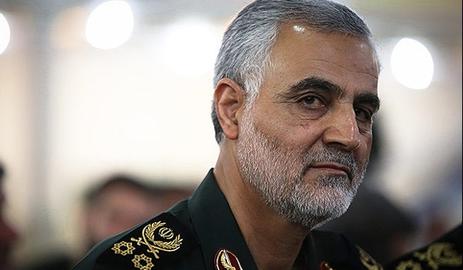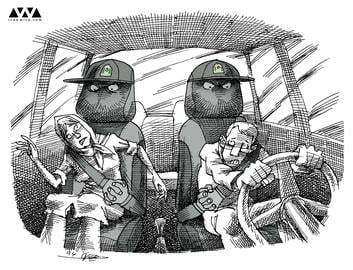One of Iran’s top military commanders has praised the Islamic Republic’s role in defeating ISIS and said the country’s military forces would not hesitate to take further action if a similar situation demands it.
“Sometimes we take action through diplomacy — which is a good thing and the world approves of it — but certain problems cannot be solved through diplomacy alone, especially when there is a significant problem,” said General Ghasem Soleimani, commander of the Revolutionary Guards’ expeditionary Quds Force, speaking at a service in memory of General Shaaban Nassiri. Nassiri was killed on May 26 west of the Iraqi city of Mosul while fighting against ISIS after decades of military service.
It was a profoundly suitable environment for Soleimani’s comments, and a sterling opportunity to demonstrate the importance of Iran’s military might in times of conflict, and in supporting its heroes.
Nassiri fought in the Iran-Iran war of 1980-1988 and had been involved in the six-year war in Syria, backing President Bashar al-Assad. At the time of his death, he was a senior commander of the Popular Mobilization Forces (PMF), the Iraqi Shia militia supported by the Islamic Republic.
Ghasemi said the Iranian Defense Ministry’s arms factories were working triple shifts around the clock to provide the PMF with arms and ammunition [Persian link], and celebrated Iran’s forces for knowing when to take direct and effective action. According to Soleimani, Abu Mahdi al-Muhandis, the Commander of the PMF, “has secured the keys to the Islamic Republic’s arm depots because the Islamic Republic of Iran is not like others — who take the Iraqi people’s money but when it is urgently needed, do not supply them with arms.” Soleimani said that the although Shaaban Nassiri was over 50, he had continued to fight bravely on the frontline until the day of his death.
Soleimani also proudly announced that at one point, when the Iraqi prime minister had requested it, the Revolutionary Guards’ Air Force put its only squadron of Russian-built Sukhoi fighters at his disposal. Iran, he said, has sent Iraq “thousands of tons of arms and ammunition” without asking for anything in return.
In the past, Revolutionary Guards commanders have repeatedly claimed that Iranian military personnel had played only an advisory role in Iraq, but Soleimani’s statements confirm not only that Iran had provided the Iraqis with vast amounts of arms and ammunition, but also put its men onto the battlefields.
And President Rouhani Agrees
But Soleimani was not the only one to take the opportunity to boast about Iran’s military role in the region. Even under the harshest sanctions, President Rouhani told an audience at a healthcare conference on July 11, Iran had provided Iraq and Syria with all the necessary funds for armaments in their fight against ISIS.
This praise of Iran’s military might comes from outside the confines of the Iranian regime too. “We are open about the fact that Hezbollah's budget, its income, its expenses, everything it eats and drinks, its weapons and rockets, come from the the Islamic Republic of Iran,” said the Lebanese Hezbollah Secretary General Hassan Nasrallah on June 24, 2016. “As long as Iran has money, we will have money.”
And on July 5, Hamas leader Ismail Haniyeh extended a warm thanks to Iran for the assistance it had granted to Hamas, especially to the militia’s Izz ad-Din al-Qassam Brigades, and for their “boundless support” for its armed struggle. Prior to this, on November 25, 2015, Ayatollah Khamenei said in a speech that the “West Bank must be armed like Gaza.”
In September 2016, Saudi Arabia accused Iran of supplying weapons to Shia rebels in Yemen and urged the UN Security Council to impose sanctions on Tehran for violating an arms embargo. Then, on March 21 of this year, Reuters reported that Iran had been sending advanced weapons and military advisers to Yemen's rebel Houthi movement, including long-range ballistic missiles, drones and Kornet anti-tank weapons. “We see Iran supporting the Houthis in Yemen and trying to take over the government, supplying weapons to the Houthis, smuggling explosives to Bahrain, Kuwait and Saudi Arabia,” said Saudi Foreign Minister Adel Al Jubeir on August 31, 2016.
Iran supports Shia opposition groups in both Saudi Arabia and Bahrain. Kuwait has accused Iran of supporting Shia terrorists groups and has said that a number of Shia men who had been arrested for smuggling arms into Kuwait had received military training from Hezbollah.
The picture emerging from statements made by both Iranian political and military officials, put together with accusations from Arab countries, is of Iran as an arms supply hub in the Middle East. Under the command of General Soleimani, Iran makes its direct influence felt in Lebanon, Palestine, Iraq, Yemen, Syria. Indirectly, it makes its mark in Saudi Arabia, Bahrain and Kuwait too.
The fact that President Rouhani is not only board with these statements but issues some of his own — at least when it comes to Iran’s military role in Iraq and Syria — shows that support for such activities has a broad base in the Islamic Republic. It is not limited to the Revolutionary Guards and the country’s conservative hardliners, something that will no doubt sit uncomfortably with those analysts hoping to demonstrate that a “moderate” president means a less active military. Militarism has always been a powerful component of Iranian domestic politics, but its obvious now that has begun to dominate Iran’s entire diplomatic outreach in the Middle East.
visit the accountability section
In this section of Iran Wire, you can contact the officials and launch your campaign for various problems


























comments